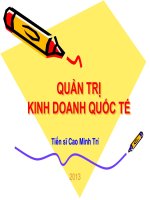Bài giảng Quản trị kinh doanh quốc tế Chương 4 Môi trường văn hóa
Bạn đang xem bản rút gọn của tài liệu. Xem và tải ngay bản đầy đủ của tài liệu tại đây (32.8 KB, 2 trang )
Auditor Independence. The hearing experts also criticized the Enron Board and its
Audit Committee for inadequate oversight to ensure the independence and objectivity of
Andersen in its role as the company’s outside auditor. The Audit Committee formally
reviewed Andersen’s independence annually, and Committee members told the Subcommittee
staff there had never been any sign of a problem. The evidence suggests, however, that the
Audit Committee did not probe the independence issue, nor did it initiate the type of
communications with Andersen personnel that would have led to its discovering Andersen
concerns with Enron accounting practices.
The Audit Committee had very limited contact with Andersen, essentially
communicating with Andersen personnel only at Board meetings. The Audit Committee
Chairman for more than ten years was Dr. Jaedicke. Despite his long tenure on the Audit
Committee, the interviews disclosed that Dr. Jaedicke had “rarely” had any contact with
Andersen outside of an official Audit Committee or Board meeting. None of the other
interviewed Audit Committee members had ever contacted anyone from Andersen regarding
Enron outside of an official Enron Committee or Board meeting. None had ever telephoned
Andersen directly.
The Audit Committee members indicated that they had thought Andersen and Enron
had a good working relationship, and taken great comfort in knowing that Andersen was more
than Enron’s outside auditor, but also provided Enron with extensive internal auditing and
consulting services, combining its roles into what Enron called “an integrated audit.” Dr.
Jaedicke maintained that it was a significant benefit to Enron for Andersen to be involved with
Enron’s activities on a day-to-day basis and to help the company design its most complex
transactions from the start. Although one Board member, Lord Wakeham, indicated that he
had been concerned that this high level of involvement meant Andersen might be too close to
Enron management, most Board members indicated that issue had not been a concern. No
Board member expressed any concern that Andersen might be auditing its own work, or that
Andersen auditors might be reluctant to criticize Andersen consultants for the LJM or Raptor
structures that Andersen had been paid millions of dollars to help design.190
In contrast, the accounting and corporate governance experts at the May 7 hearing condemned
the very concept of an integrated audit, not only for diluting the outside auditor’s
independence, but also for reducing the effectiveness of an outside audit by allowing the
auditor to audit its own work at the company. Mr. Sutton called it a “terrible idea,” while Mr.
Campbell called it a “horrible practice and I do not think it should be permitted.”191
Enron Board members told the Subcommittee staff that they had been unaware of any
tensions between Andersen and Enron and unaware of the many concerns Andersen had with
Enron’s accounting practices. The interviewed Board members said that they had not been
informed and were unaware of a February 2001 visit paid by the head of Andersen, Joseph
Berardino, to Enron’s headquarters and did not know why the meeting took place or what was
discussed. They also said they were unaware that, shortly after the visit, in March 2001, a
senior Andersen partner, Carl Bass, was removed from his Enron oversight role at Enron’s
request. The Board members observed that they had given Andersen regular opportunities
outside the presence of Enron management to communicate any concerns about the company,
including whether company officials were pressuring Andersen accountants who raised
objections to company proposals. They expressed shock and dismay that Andersen had never
conveyed its many concerns about Enron’s accounting and transactions to the Enron Board.
The interviewed Board members indicated that they had not considered whether
Andersen might be reluctant to express serious concerns about Enron accounting practices out
of an unwillingness to upset Enron management or endanger its fees. A number of the
interviewed Directors discounted the importance of Andersen’s fees, even though Enron was
one of Andersen’s largest clients and, during 2000, paid Andersen about $52 million or $1
million per week for its work. Andersen’s consulting fees at Enron exceeded its auditing fees
for the first time in 1999, and, in 2000, totaled about $27 million compared to auditing fees of
about $25 million.192
When asked by Senator Collins at the hearing if he had “ever known an auditor to
come in and say, we are not independent, we are too close to management,” Dr. Jaedicke said
no, “[t]hey would not last very long if they did that.” Senator Collins responded:
“Exactly my point. ... When you are making over $40 million a year, the auditor is not
likely to come to the Audit Committee and say anything other than that they are
independent. Is it not the job of the Audit Committee to make sure that the auditor
truly is giving full, accurate, and appropriate advice to the Board?”
The facts suggest that the Enron Audit Committee went through the motions of asking
Andersen about its independence, relied on what it was told, and did little more to evaluate the
relationship between the auditor and the company. Had it dug deeper, the Enron Audit
Committee might have uncovered the ongoing tensions between the company and its auditor
and the many misgivings Andersen expressed internally while going along with Enron’s high
risk accounting.









